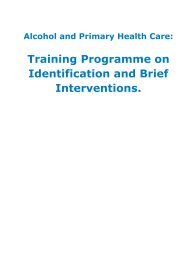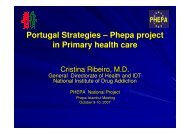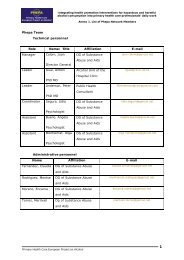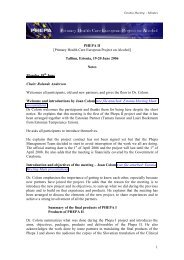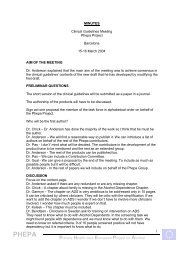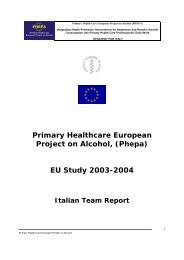Annex 7. Evaluation: Questionnaire and Report
Annex 7. Evaluation: Questionnaire and Report
Annex 7. Evaluation: Questionnaire and Report
You also want an ePaper? Increase the reach of your titles
YUMPU automatically turns print PDFs into web optimized ePapers that Google loves.
Primary Health Care<br />
European Project on Alcohol<br />
Integrating health promotion interventions for hazardous <strong>and</strong> harmful<br />
alcohol consumption into primary health care professionals’ daily work<br />
<strong>Annex</strong> <strong>7.</strong> <strong>Evaluation</strong>: <strong>Questionnaire</strong><br />
INSTRUCTIONS<br />
This questionnaire has been designed to assess the PHEPA project • . The tool asks<br />
questions about different aspects of our Project <strong>and</strong> allows you to express your opinions<br />
<strong>and</strong> provide information about your experiences anonymously. There are no right or<br />
wrong answers to the questions. Thoughtful <strong>and</strong> honest responses will give us the most<br />
valuable information. Your answers will be used to generate a report for the EC. Please<br />
answer every question. Thank you for your collaboration.<br />
A. ROLE<br />
1. What is your role in the project?<br />
Partner<br />
Observer<br />
Expert<br />
Others (please specify:<br />
2. What tasks are involved in your role?<br />
3. How clearly were your tasks clarified by the project managers?<br />
Completely clarified<br />
Mostly clarified<br />
Somewhat clarified<br />
A little clarified<br />
Not at all clarified<br />
4. What are the main barriers you confront when carrying out these activities?<br />
5. How much participative is your role?<br />
Extremely high participation<br />
High participation<br />
Some participation<br />
Low participation<br />
No participation<br />
6. How satisfied are you with your role in the project?<br />
Completely satisfied<br />
• The <strong>Questionnaire</strong> is partially adapted from the PARTNERSHIP SELF-ASSESSMENT TOOL 2.0<br />
Developed by The Center for the Advancement of Collaborative Strategies in Health at The New York<br />
Academy of Medicine. The Tool is available online at: http://www.partnershiptool.net/.<br />
Primary Health Care European Project on Alcohol<br />
1
Primary Health Care<br />
European Project on Alcohol<br />
Integrating health promotion interventions for hazardous <strong>and</strong> harmful<br />
alcohol consumption into primary health care professionals’ daily work<br />
<strong>Annex</strong> <strong>7.</strong> <strong>Evaluation</strong>: <strong>Questionnaire</strong><br />
Mostly satisfied<br />
Somewhat satisfied<br />
A little satisfied<br />
Not at all satisfied<br />
B. LEADERSHIP<br />
<strong>7.</strong> Please rate the effectiveness of leadership in the following areas:<br />
a. Taking responsibility of the project<br />
Excellent Very<br />
good<br />
Good Fair Poor<br />
b. Motivating people involved<br />
c. Working to develop a common underst<strong>and</strong>ing <strong>and</strong><br />
vocabulary<br />
d. Fostering respect, trust, inclusiveness <strong>and</strong><br />
openness<br />
e. Creating an environment where different opinions<br />
can be said<br />
f. Resolving conflicts among partners<br />
g. Combining the perspectives, resources <strong>and</strong> skills of<br />
the members.<br />
C. ADMINISTRATION AND MANAGEMENT<br />
8. Please, rate the effectiveness of the staff carrying out the following activities:<br />
a. Explaining project objectives<br />
b. Coordinating communication between partners<br />
Excellent Very Good Fair Poor<br />
good<br />
c. Clarifying roles to participants<br />
d. Managing funds<br />
e. Coordinating partnership activities <strong>and</strong> meetings<br />
f. Preparing the material that informs partners <strong>and</strong><br />
helps them to take decisions on time.<br />
g. Performing secretarial duties<br />
h. Minimizing barriers to participate in meetings<br />
Primary Health Care European Project on Alcohol<br />
2
Primary Health Care<br />
European Project on Alcohol<br />
Integrating health promotion interventions for hazardous <strong>and</strong> harmful<br />
alcohol consumption into primary health care professionals’ daily work<br />
<strong>Annex</strong> <strong>7.</strong> <strong>Evaluation</strong>: <strong>Questionnaire</strong><br />
D. DECISION-MAKING<br />
9. Please, rate the influence you have had in the following areas:<br />
A lot of<br />
influence<br />
Quite<br />
influence<br />
Somewhat<br />
influence<br />
A little<br />
influence<br />
No<br />
influence<br />
a. Development of the project products<br />
b. Meeting’s Agenda<br />
c. Group decisions<br />
d. Financial <strong>and</strong> non financial resources<br />
10. How comfortable are you with the way decisions are being made?<br />
Extremely comfortable<br />
Very comfortable<br />
Somewhat comfortable<br />
A little comfortable<br />
Not at all comfortable<br />
11. How often do you feel that you have been left out of the decision making process?<br />
Always<br />
Most of the time<br />
Sometimes<br />
Almost never<br />
Never<br />
E. BENEFITS AND COSTS<br />
12. Please rate the advantages of participating in this project?<br />
Enhanced ability to address an important issue<br />
Most<br />
important<br />
Least<br />
important<br />
Development of new skills<br />
Increased utilization of my expertise or services<br />
Acquisition of useful knowledge<br />
Enhanced ability to affect public policy<br />
Development of valuable relationship<br />
Ability to have a greater impact than I could have on<br />
my own<br />
Acquisition of additional financial support<br />
Others (specify: )<br />
Primary Health Care European Project on Alcohol<br />
3
Primary Health Care<br />
European Project on Alcohol<br />
Integrating health promotion interventions for hazardous <strong>and</strong> harmful<br />
alcohol consumption into primary health care professionals’ daily work<br />
<strong>Annex</strong> <strong>7.</strong> <strong>Evaluation</strong>: <strong>Questionnaire</strong><br />
13. What are the disadvantages of participating in this project?<br />
Insufficient influence in partnership activities<br />
Most<br />
important<br />
Least<br />
important<br />
Diversion of time <strong>and</strong> resources away from other<br />
priorities or obligations<br />
Conflict between my job <strong>and</strong> the partnership’s work<br />
Others (specify: )<br />
14. How do the advantages compare to the disadvantages of participating in this project?<br />
Much more advantages than disadvantages<br />
More advantages than disadvantages<br />
Both are equal<br />
More disadvantages than advantages<br />
Much more disadvantages than advantages<br />
F. COMMUNICATION<br />
15. Please rate your frequency of communication (by telephone, e-mail, etc) with the rest<br />
of members of the project?<br />
a. with other partners of the project<br />
Very high<br />
frequency<br />
Very<br />
frequently<br />
Somewhat<br />
frequently<br />
Low<br />
frequency<br />
Not at all<br />
frequent<br />
b. with the leaders of the project<br />
16. Please rate the quality of your communication with other members of the project<br />
a. with other partners of the project<br />
Excellent Good Fair Poor Very poor<br />
b. with the leaders of the project<br />
Primary Health Care European Project on Alcohol<br />
4
Primary Health Care<br />
European Project on Alcohol<br />
Integrating health promotion interventions for hazardous <strong>and</strong> harmful<br />
alcohol consumption into primary health care professionals’ daily work<br />
<strong>Annex</strong> <strong>7.</strong> <strong>Evaluation</strong>: <strong>Questionnaire</strong><br />
1<strong>7.</strong> How is this communication?<br />
Strongly effective<br />
Very effective<br />
Somewhat effective<br />
A little effective<br />
No effective<br />
18. How do you feel when expressing your point of view?<br />
Extremely comfortable<br />
Very comfortable<br />
Somewhat comfortable<br />
A little comfortable<br />
Not at all comfortable<br />
19. How often is your opinion listened to?<br />
Always<br />
Often<br />
Sometimes<br />
Rarely<br />
Never<br />
G. CONFLICTS<br />
20. In your opinion, what (if any) have been the major points of conflict within the<br />
members of the group?<br />
21. Please describe the way in which these conflicts have been resolved?<br />
Excellent<br />
Good<br />
Fair<br />
Bad<br />
Very bad<br />
22. How satisfied are you with the way the group deals with problems?<br />
Strongly satisfied<br />
Very satisfied<br />
Somewhat satisfied<br />
A little satisfied<br />
Not at all satisfied<br />
Primary Health Care European Project on Alcohol<br />
5
Primary Health Care<br />
European Project on Alcohol<br />
Integrating health promotion interventions for hazardous <strong>and</strong> harmful<br />
alcohol consumption into primary health care professionals’ daily work<br />
<strong>Annex</strong> <strong>7.</strong> <strong>Evaluation</strong>: <strong>Questionnaire</strong><br />
H. MEMBERS PARTICIPATION<br />
23. How often do you:<br />
Strongly<br />
frequently<br />
Very<br />
frequently<br />
Somewhat<br />
frequently<br />
A little<br />
frequently<br />
Not at all<br />
frequently<br />
a. Suggest new ideas<br />
b. Ask for additional information<br />
c. Provide information<br />
d. Express your opinion<br />
24. How many hours on average have you dedicated to the project per month:<br />
_________<br />
I. MEMBERS SATISFACTION<br />
25. Please, indicate your level of satisfaction in the following areas:<br />
a. The way people in the group work<br />
together<br />
b. The general way in which the project is<br />
being developed<br />
c. The rate of progress the project is<br />
making in achieving its objectives<br />
d. The progress of the group since the<br />
beginning of the project<br />
Completely<br />
satisfied<br />
Mostly<br />
satisfied<br />
Somewhat<br />
satisfied<br />
A little<br />
satisfied<br />
Not at all<br />
satisfied<br />
J. ACHIEVEMENT OF THE AIMS OF THE PROJECT<br />
26. Please, rate your level of agree with the followings areas:<br />
a. The project responds to the needs of the<br />
European Community about intervention<br />
on harmful <strong>and</strong> hazardous alcohol<br />
consumption.<br />
b. The project develops tools that are the<br />
most likely to work in this issue.<br />
Absolutely<br />
agree<br />
Somewhat<br />
agree<br />
Uncertain<br />
Somewhat<br />
disagree<br />
Absolutely<br />
disagree<br />
c. The tools are enough flexible as to be<br />
adapted in the different countries<br />
Primary Health Care European Project on Alcohol<br />
6
Primary Health Care<br />
European Project on Alcohol<br />
Integrating health promotion interventions for hazardous <strong>and</strong> harmful<br />
alcohol consumption into primary health care professionals’ daily work<br />
<strong>Annex</strong> <strong>7.</strong> <strong>Evaluation</strong>: <strong>Questionnaire</strong><br />
K. PRODUCTS OF THE PROJECT<br />
2<strong>7.</strong> Please, rate if your opinion has been taken into account for the development of the<br />
products<br />
a. Clinical Guidelines<br />
b. Training Manual<br />
c. Internet website <strong>and</strong> database<br />
d. National dissemination strategy<br />
Always Often Sometimes Rarely Never<br />
28. Please, rate your opinion on the achievement of the products?<br />
a. Clinical Guidelines<br />
b. Training Manual<br />
c. Internet website <strong>and</strong> database<br />
d. National dissemination strategy<br />
Excellent Good Fair Bad Very bad<br />
29. What would you change of the methodology used?<br />
30. Please, rate your level of agree with the followings areas:<br />
a. The project was all worth it?<br />
b. I would join such a project again<br />
Absolutely<br />
agree<br />
Somewhat<br />
agree<br />
Uncertain<br />
Somewhat<br />
disagree<br />
Absolutely<br />
disagree<br />
Primary Health Care European Project on Alcohol<br />
7
Primary Health Care<br />
European Project on Alcohol<br />
Integrating health promotion interventions for hazardous <strong>and</strong> harmful<br />
alcohol consumption into primary health care professionals’ daily work<br />
<strong>Annex</strong> 7: <strong>Evaluation</strong> <strong>Report</strong><br />
A. ROLE<br />
A total of 14 professionals involved in the project, of whom 79% partners, replied to the<br />
questionnaire.<br />
7%<br />
14%<br />
Partner<br />
Observer<br />
Expert<br />
79%<br />
They described the tasks involved in their role as follows:<br />
-Carrying out the project activities at country level <strong>and</strong> contributing to the project<br />
activities <strong>and</strong> objectives<br />
-Coordination of National Part of Study, data collection national situation, guideline<br />
development in our country, organisation of national website, organisation of Belgian<br />
country meetings <strong>and</strong> coordination of answering questionnaires.<br />
-Coordination. Materials development <strong>and</strong> in the future health professionals training.<br />
-I am performing all the work with Phepa in Denmark as the other members of the alcohol<br />
group are working wit other topics. The group is sleeping.<br />
-Identifying knowledge base <strong>and</strong> attitude assumptions <strong>and</strong> correcting <strong>and</strong> advising<br />
-Promotion, dissemination, training new trainers in brief implementations <strong>and</strong><br />
coordination.<br />
-Responsible for a country based team.<br />
-To help produce the documents arising from the project, to play a part in the team, to<br />
organize the country based team, to prepare the country report.<br />
-To inform the coordinators about the national situation.<br />
-To participate <strong>and</strong> actively contribute at PHEPA meeting <strong>and</strong> to try to run similar tasks as<br />
full partners if possible without funds.<br />
-To represent the interest of SBI implementation in Engl<strong>and</strong> <strong>and</strong> to advice on various<br />
aspects of the project based on my experience in the WHO Phase IV Project<br />
Primary Health Care European Project on Alcohol<br />
1
Primary Health Care<br />
European Project on Alcohol<br />
Integrating health promotion interventions for hazardous <strong>and</strong> harmful<br />
alcohol consumption into primary health care professionals’ daily work<br />
<strong>Annex</strong> 7: <strong>Evaluation</strong> <strong>Report</strong><br />
When asked about their role, 50% considered that their role involved a high participation<br />
in the project, 57% were mostly satisfied with their role <strong>and</strong> 57% commented that their<br />
role was mostly clarified<br />
How much participative is your role?<br />
How satisfied are you with your role in the<br />
project?<br />
How clearly were your tasks clarified by<br />
the project managers?<br />
0% 20% 40% 60% 80% 100%<br />
Completely/Extremely Mostly/High Somewhat/Some<br />
A little/Low<br />
Not/No<br />
What are the main barriers you confront when carrying out these activities?<br />
-Getting all national counterparts collaborating in time <strong>and</strong> adapting different aims of<br />
different national counterparts<br />
-Implementation <strong>and</strong> dissemination of the project <strong>and</strong> financial constraints at central level<br />
with retention/delay of the financial resources from the PHEPA Project.<br />
-Lack of funding (no EU member country)<br />
-Lack of man power in time<br />
-Lack of time <strong>and</strong> money related to lack of human resources<br />
-Lack of time <strong>and</strong>/or of funding<br />
-Low priority to alcohol problems among health decision <strong>and</strong> policy makers, very low<br />
budget <strong>and</strong> slow decision making<br />
-Mobilizing professionals form OHC, you need a lot of time to do it<br />
-None<br />
-There has been a lot of documentation coming out of PHEPA <strong>and</strong> sometimes this has<br />
become confusing. Also it was not clear how my specific remit regarding input from the<br />
WHO Phase IV Project was to be fulfilled.<br />
-Too much material.<br />
-Unclear task given <strong>and</strong> poor feedback from the Phepa Team<br />
Primary Health Care European Project on Alcohol<br />
2
Primary Health Care<br />
European Project on Alcohol<br />
Integrating health promotion interventions for hazardous <strong>and</strong> harmful<br />
alcohol consumption into primary health care professionals’ daily work<br />
<strong>Annex</strong> 7: <strong>Evaluation</strong> <strong>Report</strong><br />
B. LEADERSHIP<br />
When asked about the effectiveness of leadership the best areas where those related with<br />
creating a good environment, motivating people <strong>and</strong> fostering respect, trust among<br />
participants.<br />
Combining the perspectives, resources <strong>and</strong><br />
skills of the members.<br />
Resolving conflicts among partners<br />
Creating an environment where different<br />
opinions can be said<br />
Fostering respect, trust, inclusiveness <strong>and</strong><br />
openness<br />
Working to develop a common<br />
underst<strong>and</strong>ing <strong>and</strong> vocabulary<br />
Motivating people involved<br />
Taking responsibility of the project<br />
0% 20% 40% 60% 80% 100%<br />
Excellent Very Good Good Fair Poor<br />
Primary Health Care European Project on Alcohol<br />
3
Primary Health Care<br />
European Project on Alcohol<br />
Integrating health promotion interventions for hazardous <strong>and</strong> harmful<br />
alcohol consumption into primary health care professionals’ daily work<br />
<strong>Annex</strong> 7: <strong>Evaluation</strong> <strong>Report</strong><br />
C. ADMINISTRATION AND MANAGEMENT<br />
In relation to the effectiveness of the staff when carrying different activities, the worst<br />
evaluation received where in the areas of clarifying roles to participants, coordinating the<br />
communication between partners <strong>and</strong> explaining project objectives.<br />
Minimizing barriers to participate in<br />
meetings<br />
Performing secretarial duties<br />
Preparing the material that informs partners<br />
Coordinating partnership activities <strong>and</strong><br />
meetings<br />
Managing funds<br />
Clarifying roles to participants<br />
Coordinating communication between<br />
partners<br />
Explaining project objectives<br />
0% 10% 20% 30% 40% 50% 60% 70% 80% 90% 100<br />
%<br />
Excellent Very Good Good Fair Poor<br />
Primary Health Care European Project on Alcohol<br />
4
Primary Health Care<br />
European Project on Alcohol<br />
Integrating health promotion interventions for hazardous <strong>and</strong> harmful<br />
alcohol consumption into primary health care professionals’ daily work<br />
<strong>Annex</strong> 7: <strong>Evaluation</strong> <strong>Report</strong><br />
D. DECISION-MAKING<br />
Partners complaint on not having had influence on the decision on the meetings agenda<br />
<strong>and</strong> on the financial <strong>and</strong> non-financial resources of the project.<br />
Financial <strong>and</strong> non-financial resources<br />
Group decisions<br />
Meeting's agenda<br />
Development of the project products<br />
0% 20% 40% 60% 80% 100%<br />
A lot of influence Quite influence Somewhat influence<br />
A litle influence<br />
No influence<br />
43% mentioned feeling very comfortable with the way decisions have been made during<br />
the project.<br />
100%<br />
80%<br />
60%<br />
40%<br />
20%<br />
0%<br />
Not at all<br />
comfortable<br />
A litle bit<br />
confortable<br />
Somewhat<br />
comfortable<br />
Very<br />
comfortable<br />
Extremely<br />
comfortable<br />
36% responded that sometimes they had been left out of the decision making process<br />
100%<br />
80%<br />
60%<br />
40%<br />
20%<br />
0%<br />
Always<br />
Most of the<br />
time<br />
Sometimes<br />
Almost never<br />
Never<br />
Primary Health Care European Project on Alcohol<br />
5
Primary Health Care<br />
European Project on Alcohol<br />
Integrating health promotion interventions for hazardous <strong>and</strong> harmful<br />
alcohol consumption into primary health care professionals’ daily work<br />
<strong>Annex</strong> 7: <strong>Evaluation</strong> <strong>Report</strong><br />
E. BENEFITS AND COSTS<br />
The main advantages of participating in the project were the possibility to have a greater<br />
impact than being alone <strong>and</strong> the enhanced ability to affect the public health policy. The<br />
acquisition of additional financial support was not considered an advantage of joining the<br />
project.<br />
Acquisition of additional financial support<br />
Ability to have a greater impact than I could<br />
have on my own<br />
Development of valuable relationship<br />
Enhanced ability to affect public policy<br />
Acquisition of useful knowledge<br />
Increased utilization of my expertise or<br />
services<br />
Development of new skills<br />
Enhanced ability to address an important<br />
issue<br />
0% 20% 40% 60% 80% 100%<br />
Most important Extremely important Very important<br />
Somewhat important<br />
Not important<br />
Primary Health Care European Project on Alcohol<br />
6
Primary Health Care<br />
European Project on Alcohol<br />
Integrating health promotion interventions for hazardous <strong>and</strong> harmful<br />
alcohol consumption into primary health care professionals’ daily work<br />
<strong>Annex</strong> 7: <strong>Evaluation</strong> <strong>Report</strong><br />
Regarding the disadvantages of participating in this project the most important was the<br />
conflict between the own job <strong>and</strong> the partnership’s work.<br />
Conflict between my job <strong>and</strong> the<br />
partnership’s work<br />
Diversion of time <strong>and</strong> resources away<br />
from other priorities or obligations<br />
Insufficient influence in partnership<br />
activities<br />
0% 20% 40% 60% 80% 100%<br />
Most important Extremely important Very important<br />
Somewhat important<br />
Least important<br />
Besides that the majority considered that there were more advantages then<br />
disadvantages.<br />
100%<br />
90%<br />
80%<br />
70%<br />
60%<br />
50%<br />
40%<br />
30%<br />
20%<br />
10%<br />
0%<br />
Much more<br />
disadvantages than<br />
advantages<br />
More disadvantages<br />
than advantages<br />
Both are equal<br />
More advantages than<br />
disadvantages<br />
Much more<br />
advantages than<br />
disadvantages<br />
Primary Health Care European Project on Alcohol<br />
7
Primary Health Care<br />
European Project on Alcohol<br />
Integrating health promotion interventions for hazardous <strong>and</strong> harmful<br />
alcohol consumption into primary health care professionals’ daily work<br />
<strong>Annex</strong> 7: <strong>Evaluation</strong> <strong>Report</strong><br />
F. COMMUNICATION<br />
The communication with the leaders of the project occurred more frequently than the<br />
communication among other partners.<br />
100%<br />
90%<br />
80%<br />
70%<br />
60%<br />
50%<br />
40%<br />
30%<br />
20%<br />
10%<br />
0%<br />
with other partners of the<br />
project<br />
with the leaders of the<br />
project<br />
Not at all<br />
frequent<br />
Low<br />
frequency<br />
Somewhat<br />
frequently<br />
Very<br />
frequently<br />
Very high<br />
frequency<br />
The quality of the communication was good but it was a little bit more difficult between<br />
partners.<br />
with the leaders of<br />
the project<br />
with other partners<br />
of the project<br />
0% 20% 40% 60% 80% 100%<br />
Excellent Good Fair Poor Very poor<br />
And communication was very effective for 57% of the participants.<br />
36%<br />
7% Strongly<br />
effective<br />
Very effective<br />
57%<br />
Somewhat<br />
effective<br />
A little<br />
effective<br />
Primary Health Care European Project on Alcohol<br />
8
Primary Health Care<br />
European Project on Alcohol<br />
Integrating health promotion interventions for hazardous <strong>and</strong> harmful<br />
alcohol consumption into primary health care professionals’ daily work<br />
<strong>Annex</strong> 7: <strong>Evaluation</strong> <strong>Report</strong><br />
57% of participants felt very comfortable when expressing your point of view.<br />
100% Not at all<br />
comfortable<br />
90%<br />
80%<br />
A little<br />
70%<br />
comfortable<br />
60%<br />
Somewhat<br />
50%<br />
comfortable<br />
40%<br />
30%<br />
Very comfortable<br />
20%<br />
10%<br />
Extremely<br />
0%<br />
comfortable<br />
And 71% felt that their opinion was listened<br />
100%<br />
80%<br />
60%<br />
40%<br />
20%<br />
Never<br />
Rarely<br />
Sometimes<br />
Often<br />
Always<br />
0%<br />
G. CONFLICTS<br />
The major points of conflict seen within the members of the group were the following:<br />
-Fluctuation of some participation of the members of the group<br />
-Small group of decision makers between meetings<br />
-Rigid way of data collection procedure through questionnaire not really useful for<br />
national action<br />
-Development of training approach rather centrally not adapted to local settings.<br />
-Technical discussions on the contents of clinical guidelines<br />
-There was no real conflict only some different opinions that were listened to, some<br />
of them were resolved <strong>and</strong> some of them remained.<br />
Primary Health Care European Project on Alcohol<br />
9
Primary Health Care<br />
European Project on Alcohol<br />
Integrating health promotion interventions for hazardous <strong>and</strong> harmful<br />
alcohol consumption into primary health care professionals’ daily work<br />
<strong>Annex</strong> 7: <strong>Evaluation</strong> <strong>Report</strong><br />
36% of the participants mentioned that the conflicts were solved in an excellent manner<br />
100%<br />
80%<br />
60%<br />
40%<br />
20%<br />
0%<br />
Very bad<br />
Bad<br />
Fair<br />
Good<br />
Excellent<br />
43% were very satisfied with the way the group dealt with problems.<br />
100% Not at all<br />
satisfied<br />
80%<br />
A little satisfied<br />
60%<br />
40%<br />
20%<br />
0%<br />
Somewhat<br />
satisfied<br />
Very satisfied<br />
Strongly satisfied<br />
H. MEMBERS PARTICIPATION<br />
The majority of the members commented a somewhat frequently participation in the<br />
project by expressing their opinion, providing information <strong>and</strong> suggesting new ideas.<br />
Express your opinion<br />
Provide information<br />
Ask for additional information<br />
Suggest new ideas<br />
0% 20% 40% 60% 80% 100%<br />
Strongly frequently Very frequently Somewhat frequently<br />
A little frequently<br />
Not at all frequently<br />
Primary Health Care European Project on Alcohol<br />
10
Primary Health Care<br />
European Project on Alcohol<br />
Integrating health promotion interventions for hazardous <strong>and</strong> harmful<br />
alcohol consumption into primary health care professionals’ daily work<br />
<strong>Annex</strong> 7: <strong>Evaluation</strong> <strong>Report</strong><br />
On average the hours dedicated per month to the project have been: 14.82 [1-40]<br />
I. MEMBERS SATISFACTION<br />
Members were mostly satisfied with the different areas evaluated<br />
The progress of the group since the<br />
beginning of the project<br />
The rate of progress the project is making<br />
in achieving its objectives<br />
The general way in which the project is<br />
being developed<br />
The way people in the group work together<br />
0% 20% 40% 60% 80% 100%<br />
Completely satisfied Mostly satisfied Somewhat satisfied<br />
A little satisfied<br />
Not at all satisfied<br />
J. ACHIEVEMENT OF THE AIMS OF THE PROJECT<br />
The level of agreement in the different aspects was high, especially in relation to the<br />
project responding to the needs of the European Community about intervention on<br />
harmful <strong>and</strong> hazardous alcohol consumption.<br />
The tools are enough flexible as to be<br />
adapted in the different countries<br />
The project develops tools that are the most<br />
likely to work in this issue.<br />
The project responds to the needs of the<br />
European Community about intervention on<br />
harmful <strong>and</strong> hazardous alcohol<br />
consumption.<br />
0% 20% 40% 60% 80% 100%<br />
Absolutely agree Somewhat agree Uncertain<br />
Somewhat disagree<br />
Absolutely disagree<br />
Primary Health Care European Project on Alcohol<br />
11
Primary Health Care<br />
European Project on Alcohol<br />
Integrating health promotion interventions for hazardous <strong>and</strong> harmful<br />
alcohol consumption into primary health care professionals’ daily work<br />
<strong>Annex</strong> 7: <strong>Evaluation</strong> <strong>Report</strong><br />
K. PRODUCTS OF THE PROJECT<br />
Asked about if her opinion has been taken into account when developing the products of<br />
the project they considered that they opinion was taken into account especially in the<br />
clinical guidelines.<br />
National dissemination strategy<br />
Internet website <strong>and</strong> database<br />
Training Manual<br />
Clinical Guidelines<br />
0% 10% 20% 30% 40% 50% 60% 70% 80% 90% 100%<br />
Always Often Sometimes Rarely Never<br />
28. Please, rate your opinion on the achievement of the products?<br />
National<br />
dissemination<br />
strategy<br />
Internet website <strong>and</strong><br />
database<br />
Training Manual<br />
Clinical Guidelines<br />
0% 10% 20% 30% 40% 50% 60% 70% 80% 90% 100%<br />
Excellent Good Fair Bad Very bad<br />
Primary Health Care European Project on Alcohol<br />
12
Primary Health Care<br />
European Project on Alcohol<br />
Integrating health promotion interventions for hazardous <strong>and</strong> harmful<br />
alcohol consumption into primary health care professionals’ daily work<br />
<strong>Annex</strong> 7: <strong>Evaluation</strong> <strong>Report</strong><br />
29. What would you change of the methodology used?<br />
-Difficult to change something too centralized in my point of view<br />
-I think that the methodology was the right one<br />
-Insist on deadlines!! Otherwise everything as could as it can be with so many partners.<br />
-More interactive leadership, more clarification on budget distribution, less questionnaire<br />
approach, exchanging all country documents freely within group, developing methodology<br />
jointly or clarification if steering groups exists what decisions are taken<br />
-The way of doing dissemination, implementation <strong>and</strong> sustainability <strong>and</strong> the way of giving<br />
an ongoing support to primary care-creating a good network involving primary, secondary<br />
<strong>and</strong> tertiary levels of care.<br />
-There was a long delay in being able to pay members of CBT the per diem expenses that<br />
had been agreed <strong>and</strong> this should have happened sooner. Communication on this matter<br />
was not altogether clear. The different docs involved were not clearly differentiated.<br />
70% of the participants absolutely agreed with the idea that the project was all worth it<br />
<strong>and</strong> that they will join such a project again.<br />
I will join such a<br />
project again<br />
Absolutely<br />
agree<br />
Somewhat<br />
agree<br />
Uncertain<br />
The project was<br />
all worth it?<br />
0% 20% 40% 60% 80% 100%<br />
Somewhat<br />
disagree<br />
Absolutely<br />
disagree<br />
Primary Health Care European Project on Alcohol<br />
13



